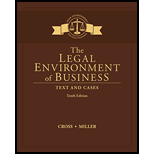
The Legal Environment of Business: Text and Cases (MindTap Course List)
10th Edition
ISBN: 9781305967304
Author: Frank B. Cross, Roger LeRoy Miller
Publisher: Cengage Learning
expand_more
expand_more
format_list_bulleted
Question
Chapter 3, Problem 2CT
Summary Introduction
Case summary:The company TFCBP hired a forty-seven-year-old person, AL, for a warehouse position who was subject to a thirty-day prohibition period. The work performance was evaluated at the end of thirty days period by TFCBP and it decided not to retain AL. The person AL filed a case against the company TFCBP, alleging them of discrimination on the basis of age and race. The company TFCBP filed a summary of judgment motion. The performance of AL was presented as evidence to the court. The motion was granted. The appeal was filed by AL.
To Find:The abolishment of the motion of summary judgment and other motion, so that the trial proceeds in all lawsuits.
Expert Solution & Answer
Want to see the full answer?
Check out a sample textbook solution
Students have asked these similar questions
Answer
Would the Arizona ruling SB1070 lead to or not lead to discriminatory practices or even harassment against minorities, specifically Mexican-Americans, by Arizona law enforcement officers?
Please prove references.
After describing a threat/risk in either the revenue cycle (i.e., in sales and cash collection activities) or the expenditure cycle (i.e., in purchases or cash disbursement activities).
What are specific internal controls that might be applied to mitigate each of the threats we've identified?
Chapter 3 Solutions
The Legal Environment of Business: Text and Cases (MindTap Course List)
Knowledge Booster
Similar questions
- M” method Given the following model, solve by the method of “M”. (see image)arrow_forwardSimplex Method Three types of paints are manufactured in one machine; Interior paint, Exterior paint and Paint for metal structures. The preparation time for each type of paint is 2, 3 and 4 minutes respectively and the processing time is 3, 2 and 1 minute. The profit contributed by each product is 12, 10 and 15 dollars respectively. The machine availability is 100 minutes and 200 minutes for machine setup. 1. Determine the optimum number of types of paints to be manufactured. 2. Determine the optimal utility value.arrow_forwardCompare and contrast the procedures for lodging an objection in Jamaica with those of Trinidad and Tobago.arrow_forward
- What if you could change how federal justices were appointed? Would you change the appointment process? References please.arrow_forwardThe company LED S.A DE C.V. produces 2 devices for lamps, devices 1 and 2 that require metal parts and electrical parts. The manager wants to determine how many units of each product should be manufactured to maximize the profit for each unit, device 1 requires 2 metal parts and 4 electrical parts, device 2 requires 4 metal parts and 2 electrical parts, the company has 24 units of each material available for batch production, device 1 generates $4 profit and device 2 generates $6 profit. a) Formulate PL model. b) Solve by the graphical method and determine what is the resulting maximum profit. Translated with DeepL.com (free version)arrow_forwardThe actual cost of direct labor per hour is $16.25 and the standard cost of direct labor per hour is $15.00. The direct labor hours allowed per finished unit is 0.60 hours. During the current period, 4,500 units of finished goods were produced using 2,900 direct labor hours. How much is the direct labor rate variance? A. $3,625 favorable B. $3,625 unfavorable C. $4,350 favorable D. $4,350 unfavorablearrow_forward
- On January 1 of the current year, Piper Company issues a 4-year, non-interest-bearing note with a face value of $8,000 and receives $4,952 in exchange. The recording of the issuance of the note includes a: a. credit to Notes Payable for $4,952. b. credit to Discount on Notes Payable for $3,048. c. debit to Discount on Notes Payable for $3,048. d. debit to Cash for $8,000.arrow_forwardPLease helparrow_forwardPLEASE HELParrow_forward
- no ai do not answer this question if data is not clear or image is blurr. but do not amswer with unclear values. i will give unhelpful.arrow_forwardWhat would be the effect??arrow_forwardEstefan Industies has a new project available that requires an initial investment of sex million. The project will provide unlevered cash flows of $925,000 per year for the next 20 years. The company will finance the project with a debt-value ratio of 35. The company's bonds have a YTM of 5.9 percent. The companies with operations comparable to this project have unlevered betas of 1.09, 1.17, 1.28, and 1.20. The risk-free rate is 3.6 percent, and the market risk premium is 7 percent. The tax rate is 21 percent. What is the NPV of this project?arrow_forward
arrow_back_ios
SEE MORE QUESTIONS
arrow_forward_ios
Recommended textbooks for you
 BUSN 11 Introduction to Business Student EditionBusinessISBN:9781337407137Author:KellyPublisher:Cengage Learning
BUSN 11 Introduction to Business Student EditionBusinessISBN:9781337407137Author:KellyPublisher:Cengage Learning Essentials of Business Communication (MindTap Cou...BusinessISBN:9781337386494Author:Mary Ellen Guffey, Dana LoewyPublisher:Cengage Learning
Essentials of Business Communication (MindTap Cou...BusinessISBN:9781337386494Author:Mary Ellen Guffey, Dana LoewyPublisher:Cengage Learning Accounting Information Systems (14th Edition)BusinessISBN:9780134474021Author:Marshall B. Romney, Paul J. SteinbartPublisher:PEARSON
Accounting Information Systems (14th Edition)BusinessISBN:9780134474021Author:Marshall B. Romney, Paul J. SteinbartPublisher:PEARSON
 International Business: Competing in the Global M...BusinessISBN:9781259929441Author:Charles W. L. Hill Dr, G. Tomas M. HultPublisher:McGraw-Hill Education
International Business: Competing in the Global M...BusinessISBN:9781259929441Author:Charles W. L. Hill Dr, G. Tomas M. HultPublisher:McGraw-Hill Education

BUSN 11 Introduction to Business Student Edition
Business
ISBN:9781337407137
Author:Kelly
Publisher:Cengage Learning

Essentials of Business Communication (MindTap Cou...
Business
ISBN:9781337386494
Author:Mary Ellen Guffey, Dana Loewy
Publisher:Cengage Learning

Accounting Information Systems (14th Edition)
Business
ISBN:9780134474021
Author:Marshall B. Romney, Paul J. Steinbart
Publisher:PEARSON


International Business: Competing in the Global M...
Business
ISBN:9781259929441
Author:Charles W. L. Hill Dr, G. Tomas M. Hult
Publisher:McGraw-Hill Education
